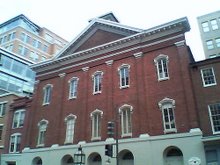
To me, Web 2.0 means a further expansion of technology to better serve library patrons and to give them more personal freedom and options in accessing materials without the need to enter a library building, or request a librarian. This does not mean that a librarian's skills will become obsolete, only redefined.
Some thirteen years ago, Baltimore County Public Library made a decision that it was in the information business, not just the book business. The library redefined itself in broader terms as a prelude to installing internet computers for public use in the branches. At the time, it was considered a gamble. Now those computers are constantly busy, with patrons waiting in line to sign up for them.
At about the same time, we started an online catalog, gradually phasing out the physical card catalogs in the branches while retaining only one main card catalog at Administrative Offices as a "backup." Again, it was considered a risk. Now even the card catalog "backup" is gone. We have been fully online for years and have never looked back.
So when I read Rick Anderson proposal that libraries might one day eliminate most or all physical collections in favor of a totally online environment with Web 2.0, I am open to the idea, though again, it seems like a risk.
Already certain reference works are strictly online-accessible through websites, with cumbersome books disappearing such as Valueline, Lexis Nexis and some Maryland State reference sites. Such sites are easy to update on a daily basis, and now with cell phones able to access the internet, are more available than ever. So Web 2.0 seems to be the inevitable outcome of a long series of decisions to pool information online.
I especially enjoyed reading Chip Nilges’s updates on OCLC’s future as part of Web 2.0. I have watched that database grow from a simple supplier of bib records to an online conglomerate providing everything from translation services to Interlibrary Loan. I was especially impressed with the ability to use tags and place delimiters in subject headings to create a kind of Mappr graphics for patrons. The possibilities are endless.
There are, of course, always setbacks to technology. E-books and audiobooks have had some access problems. Also, the social environment of the library could suffer, as discussed by Dr. Wendy Schultz, or it could simply change to meet computer-based needs. Current computer popularity at the library might also mean that many still don’t have computer access at home, and might be overlooked as patrons in a library without walls.
Nevertheless, I am optimistic that libraries in general have a keen sixth sense about when it is time to discard print collections and shift to complete online resources, based on the community they serve and the funding at their disposal. I am hopeful that a library without walls, making use of the many options Web 2.0 offers, and flexible enough to provide service to users at home or anywhere, will be just as welcomed and even more widely accessed than the physical libraries of today.




















